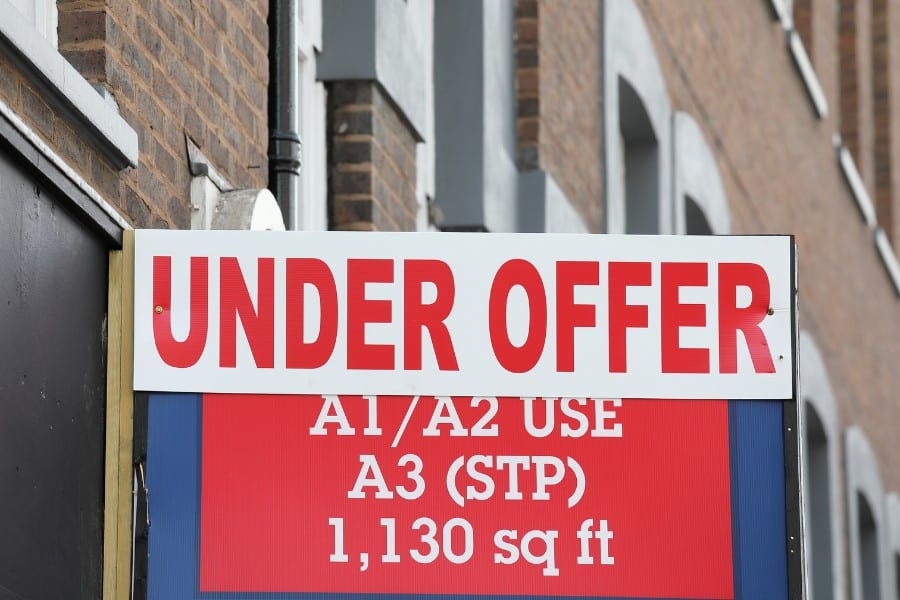
You might see the tag ‘under offer’ when looking at property listings, but what does it actually mean? Quite simply, under offer means that an offer has been made to buy a property, but the seller is still considering whether or not they will accept it. There’s nothing legally binding about it, no contracts have been signed and no money has been exchanged. There are other terms you might see too, like Subject To Contract, which we will also look into in this article.
Table of Contents
Toggle
Now that we’ve covered the question – What Does Under Offer Mean – it’s worth looking at what this process entails. A buyer or estate agent will mark a property as being ‘under offer’ when they have received a reasonable offer for their property and they are taking it into consideration. Sometimes a seller accepts the offer right away, although usually they have several offers to think about, or the buyer is part of a property chain, i.e. they need to sell their house first. There is no set timescale for a property being under offer – it can depend on a lot of factors, such as awaiting paperwork from both parties solicitors, survey results, and more.
Many estate agents label properties as ‘under offer’ to drive interest and create a sense of urgency. A lot of buyers might withdraw their offer if they change their mind, and in turn, sellers can refuse any offer that comes their way if it’s a poor offer. So really, under offer shouldn’t prevent you from making an offer yourself.

Sold Subject To Contract, often shortened to SSTC, means more than under offer. It means that an agreement has been made that the buyer will be purchasing the property, but that contracts have not yet been exchanged and the conveyancing process is still underway.
Sold Subject To Contract is a little more solid, but without that all-important contract, nothing is set in stone. The conveyancing process can be long and arduous, with many steps along the way that can be a roadblock to completion. Many mortgage lenders insist on certain criteria being fulfilled before they will provide a mortgage to a prospective buyer, such as a mortgage valuation or survey.

A mortgage valuation is done to make sure that the property is suitable as security for the loan and to protect the interests of the lender. A surveyor evaluates the property’s market value, structural integrity, and overall condition to determine if it meets the lender’s criteria for mortgage approval. The valuation report may influence the lender’s decision on the loan amount, interest rates, or conditions attached to the mortgage. The bank doesn’t want to be stuck with an unsellable, broken-down property in the event that the borrower fails to pay back their mortgage.
It’s important to note that a mortgage valuation is different from a comprehensive building survey. A mortgage valuation is usually paid for by the borrower and is primarily for the benefit of the lender, whereas a building survey is more detailed and comprehensive, providing a thorough assessment of the property’s condition for the buyer’s information.

Another term that appears on property listings is a basic survey, also known as a homebuyer’s report or RICS (Royal Institution of Chartered Surveyors) Level 1 Survey. This is a basic survey that shows the condition of different parts of the building using a ‘traffic light’ system. This indicates the severity of any problems with the property. This kind of survey is fine for most standard, modern properties that are built from common building materials and in reasonable condition. A Level 1 survey, however, does not give a valuation of the property nor does it include any advice on how to approach any issues with the property.
The next level of survey is a RICS Level 2 Survey. This checks for everything that a Level 1 survey would, and includes roof spaces and cellars. The surveyor will be able to provide a valuation of the property, if required, and offer advice on maintenance the property would need as well as the cost of any required repairs. If a surveyor indicates that the roof of a property needs £10,000’s worth of work, this could be used as a point of negotiation on the price of the property.
There is also a more in-depth version which is known as a RICS Level 3 Survey, or full structural survey. This covers everything that the Level 1 and 2 surveys do, as well as any potential or hidden defects, the scope of any required repairs and the consequences of failing to do said repairs. A Level 3 survey is recommended if you are buying a property that is older than 50 years, is in poor condition, is a listed building, has some unique non-standard features like a thatched roof, or if you plan to do significant renovations to the property. This kind of survey is the most expensive but is also the most thorough.
Buyers cover the cost of a survey most of the time, although sometimes sellers conduct a survey before listing the property for sale, to make sure there are no issues that could jeopardise their sale. If any survey reveals anything untoward with the property, such as wiring issues or structural problems, the buyers may offer a lower price for the property or pull out of the deal entirely.

After you have made an offer on a property, another party could make a better offer, which the seller may accept more readily. This is known as ‘gazumping’ and can be very frustrating. You can reduce the risk of this happening by being as organised as possible before making your offer. Make sure your offer is competitive, but also reasonable – it’s not uncommon to make an offer below a listed price, but bear in mind that in-demand properties could even command a higher price than that listed. Think about how high you can realistically go before placing high offers.
A potential sale may fall through during the under-offer stage or even at the SSTC stage if there are issues like securing finance, survey results, or other unforeseen circumstances. Make sure everything is in place before making an offer if you want to avoid losing out – secure a mortgage if required and seek legal advice from a solicitor who specialises in conveyancing.
In essence, while a property may be marked as under offer, this does not mean anything is finalised with a sale – people reject or withdraw offers all the time. Both sellers and buyers should be diligent at this stage especially to avoid jeopardising a potential deal, but also not be too hasty. Always seek professional advice and get an appropriate level of survey done before signing any contracts. Try not to get disheartened if an offer gets rejected, or a deal falls through – remain positive and keep looking, as new properties are placed on the market every day and you might find an even better deal.
We hope this article has helped you get the answer to the question – What Does Under Offer Mean along with other similar tags you may see on property listings.
Interested in property investment and ready to level up? Check out our FREE property guides and exclusive free training!
You May Also Be Interested In...

A Guide to Selling Your Buy-To-Let Property
Thinking of selling your buy-to-let? Learn how to time the market, manage tax and maximise

Planning Permission Loopholes You Should Know About
Discover UK planning permission loopholes, permitted development rights and when you can extend, convert or
Featured Property Investment Events & Courses
The Property Deal Packaging Summit
The Property Millionaire Bootcamp
The Serviced Accommodation Bootcamp
Assets For Life LTD is a company incorporated in England and Wales with registered number 09935286 and registered offices at Assets for Life Ltd, Suite 105, Waterhouse Business Centre, 2 Cromar Way, Chelmsford, Essex, England, CM1 2QE, United Kingdom.
Assets For Life LTD is registered with the Information Commissioner’s Office, with registration number ZA280607
COPYRIGHT © 2024 ASSETS FOR LIFE, ALL RIGHTS RESERVED. WEBSITE BY AMPLIFY MARKETING